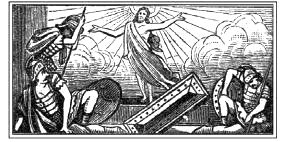
| Contents | Stabat Mater speciosa By the Crib Wherein Reposing |
BVM |

Stabat Mater speciosa is considered one of the seven greatest Latin hymns of all time and one of the tenderest. It is based upon the Gospel account of the birth of Jesus. It's much more famous twin is the Stabat Mater dolorosa, which echoes the sorrows of the Blessed Virgin Mary at the crucifixion and death of Jesus. Both of these are attributed to Jacopone da Todi (1230-1306), for they both appear together in an edition of his works published in 1495. Both hymns were known in the 13th century, so he is a possible candidate for authorship. However, there are arguments for and against his authorship and the matter is not decisively settled. Some prefer Pope Innocent III (d 1216) In any case, the fame of the Stabat Mater dolorosa quickly eclipsed that of the Stabat Mater speciosa and it was nearly lost to history. Fortunately, Antoine-Frederic Ozanam (1813-1853) rescued the hymn when he transcribed it from a fifteenth-century manuscript and published a copy of it in 1852. The hymn appears in one of Franz Liszt oratorios.
|
| STABAT Mater speciosa iuxta faenum gaudiosa, dum iacebat parvulus. |
BY, the crib wherein reposing, with His eyes in slumber closing, lay serene her Infant-boy, |
| Cuius animam gaudentem laetabundam et ferventem pertransivit iubilus. |
Stood the beauteous Mother feeling bliss that could not bear concealing, so her face o'erflowed with joy. |
| O quam laeta et beata fuit illa immaculata, mater Unigeniti! |
Oh, the rapture naught could smother of that most Immaculate Mother of the sole-begotten One; |
| Quae gaudebat et ridebat, exultabat, cum videbat nati partum inclyti. |
When with laughing heart exulting, she beheld her hopes resulting In the great birth of her Son. |
| Quisquam est, qui non gauderet, Christi matrem si videret in tanto solatio? |
Who would not with gratulation see the happy consolation of Christ's Mother undefiled? |
| Quis non posset collaetari, Christi Matrem contemplari ludentem cum Filio? |
Who would not be glad surveying Christ's dear Mother bending, praying, playing with her heavenly Child |
| Pro peccatis suae gentis Christum vidit cum iumentis et algori subditum. |
For a sinful world's salvation, Christ her Son's humiliation She beheld and brooded o'er; |
| Vidit suum dulcem Natum vagientem, adoratum, vili deversorio. |
Saw Him weak, a child, a stranger, yet before Him in the manger kings lie prostrate and adore. |
| Nato, Christo in praesepe caeli cives canunt laete cum immenso gaudio. |
O'er that lowly manger winging, joyful hosts from heaven were singing canticles of holy praise; |
| Stabat, senex cum puella non cum verbo nec loquela stupescentes cordibus. |
While the old man and the maiden, speaking naught, with hearts o'erladen, pondered on God's wondrous ways. |
| Eia, Mater, fons amoris me sentire vim ardoris fac, ut tecum sentiam. |
Fount of love, forever flowing, with a burning ardor glowing, make me, Mother, feel like thee; |
| Fac, ut ardeat cor meum in amatum Christum Deum ut sibi complaceam. |
Let my heart, with graces gifted all on fire, to Christ be lifted, and by Him accepted be. |
| Sancta Mater, istud agas, prone introducas plagas cordi fixas valide. |
Holy Mother, deign to bless me, with His sacred Wounds impress me, let them in my heart abide; |
| Tui Nati caelo lapsi, iam dignati faeno nasci, poenas mecum divide. |
Since He came, thy Son, the Holy, to a birth-place, ah, so lowly, all His pains with me divide. |
| Fac me vere congaudere, Iesulino cohaerere, donec ego vixero. |
Make me with true joy delighted, to Child-Jesus be united while my days of life endure; |
| In me sistat ardor tui, puerino fac me frui dum sum in exilio. |
While an exile here sojourning, make my heart like thine be burning with a love divine and pure. |
| Hunc ardorem fac communem, Ne me facias immunem, Ab hoc desiderio. |
Spotless Maid and sinless Woman, make us feel a fire in common, make my heart's long longing sure. |
| Virgo virginum praeclara, mihi iam non sis amara, fac me parvum rapere. |
Virgin of all virgins highest, prayer to thee thou ne'er denyest, let me bear thy sweet Child too. |
| Fac, ut pulchrum infantem portem, qui nascendo vicit mortem, volens vitam tradere. |
Let me bear Him in my bosom, Lord of life, and never lose Him, since His birth doth death subdue. |
| Fac me tecum satiari, Nato me inebriari, stantem in tripudio. |
Let me show forth how immense is the effect on all my senses of an union so divine. |
| (No Latin verse. Translator added English Verse) |
All who in the crib revere Him, like the shepherds watching near Him, will attend Him through the night, |
| Inflammatus et accensus, obstupescit omnis sensus tali me commercio. |
By thy powerful prayers protected, grant, O Queen, that His elected may behold heaven's moving light. |
| Fac, me Nato custodiri, verbo Dei praemuniri conservari gratia. |
Make me by His birth be guarded, by God's holy word be warded, by His grace till all is done; |
| Quando corpus morietur, fac, ut animae donetur tui nati gloria. Amen. |
When my body lies obstructed, make my soul to be conducted, to the vision of thy Son. Amen. |
| From Latin Hymns, March, 1894. Translation by Denis Florence MacCarthy |
<- Prev |
Next-> |
